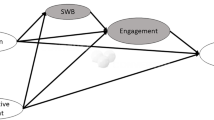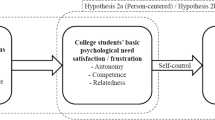Abstract
This study was aimed at assessing the assumption that maladjustment to college could lead some toward excessive social media engagement for leisure during class. Moreover, the mediating role of a new phenomenon termed fear of missing out (FoMO) linking maladjustment to college life to social media engagement was examined for the first time. Data were gathered from 290 undergraduate students. Path analysis results showed that the maladjustment to college variable is linked to social media use only insofar as it is linked to FoMO. This study lends credence to previous work by showing the robust mediating role of FoMO in explaining social media use during lectures.



Similar content being viewed by others
References
Alavi, S. S., Maracy, M. R., Jannatifard, F., & Eslami, M. (2011). The effect of psychiatric symptoms on the internet addiction disorder in Isfahan’s university students. Journal of Research in Medical Sciences. The official journal of Isfahan University of Medical Sciences, 16(6), 793–800.
Alt, D. (2015a). College students’ academic motivation, media engagement and fear of missing out. Computers in Human Behavior, 49, 111–119.
Alt, D. (2015b). Using structural equation modeling and multidimensional scaling to assess female college students’ academic adjustment as a function of perceived parenting styles. Current Psychology. doi:10.1007/s12144-015-9320-3.
Alt, D., & Geiger, B. (2012). Goal orientations and tendency to neutralize academic cheating: An ecological perspective. Psychological Studies, 57(4), 404–416.
Aspelmeier, J. E., Love, M. M., Mcgill, L. A., Elliott, A. N., & Pierce, T. W. (2012). Self-esteem, locus of control, college adjustment, and GPA among first- and continuing-generation students: A moderator model of generational status. Research in Higher Education, 53(7), 755–781.
Baker, R. W., & Siryk, B. (1984). Measuring adjustment to college. Journal of Counseling Psychology, 31, 179–189.
Baker, R. W., & Siryk, B. (1989). Student Adaptation to College Questionnaire Manual. Los Angeles: Western Psychological Services.
Bentler, P. M. (2006). EQS 6 Structural Equations Program Manual. Encino: Multivariate Software, Inc..
Bowman, N. D. (2016). The rise (and refinement) of moral panic. In R. Kowert & T. Quandt (Eds.), The video game debate: Unraveling the physical, social, and psychological effects of digital games (pp. 22–38). New York: Routledge.
Collin, P., Rahilly, K., Richardson, I., & Third, A. (2011). The benefits of social networking services: A literature review. Cooperative research centre for young people. Melbourne: Technology and Wellbeing.
Credé, M., & Niehorster, S. (2012). Adjustment to college as measured by the student adaptation to college questionnaire: A quantitative review of its structure and relationships with correlates and consequences. Educational Psychology Review, 24(1), 133–165.
Deci, E. L., & Ryan, R. M. (1985). Intrinsic motivation and self-determination in human behavior. New York: Plenum.
Deci, E. L., & Ryan, R. M. (2008). Self-determination theory: A macrotheory of human motivation, development, and health. Canadian Psychology, 49(3), 182–185.
Ferguson, C. J. (2013). Violent video games and the supreme court: lessons for the scientific community in the wake of Brown v EMA. American Psychologist, 68(2), 57–74.
Gemmill, E., & Peterson, M. (2006). Technology use among college students: Implications for student affairs professionals. NASPA Journal, 43(2), 280–300.
Kellner, S. (2013, January 13). Is FOMO depriving us of our ability to exist in the present and take pleasure in the here and now? The Independent. Retrieved from http://www.independent.co.uk/voices/comment/is-fomo-depriving-us-of-our-ability-to-exist-in-the-present-and-take-pleasure-in-the-here-and-now-8449677.html
Kietzmann, J. H., Hermkens, K., McCarthy, I. P., & Silvestre, B. S. (2011). Social media? Get serious! Understanding the functional building blocks of social media. Business Horizons, 54, 241–251.
Kim, E. J., Namkoong, K., Ku, T., & Kim, S. J. (2008). The relationship between online game addiction and aggression, self-control and narcissistic personality traits. European Psychiatry, 23(3), 212–218.
Lidy, K. M., & Kahn, J. H. (2006). Personality as a predictor of first-semester adjustment to college: The mediational role of perceived social support. Journal of College Counseling, 9, 123–134.
Mangold, W. G., & Faulds, D. J. (2009). Social media: The new hybrid element of the promotion mix. Business Horizons, 52(4), 357–366.
Mitchell, A., & Guskin, E. (2013). Twitter news consumers: Young, mobile and educated. Pew Research Journalism Project. Retrieved from. http://www.journalism.org/2013/11/04/twitter-news-consumers-young-mobile-and-educated/
Olson, D. (2011). The relationship between community college student engagement and student usage of online social networking, Unpublished doctoral dissertation. USA: Northern Illinois University Retrieved from http://search.proquest.com/docview/920879210?accountid=40477.
Pennebaker, J. W., Colder, M., & Sharp, L. K. (1990). Accelerating the coping process. Journal of Personality and Social Psychology, 58, 528–537.
Petersen, I., Louw, J., & Dumont, K. (2009). Adjustment to university and academic performance among disadvantaged students in South Africa. Educational Psychology, 29, 99–115.
Przybylski, A. K., Murayama, K., DeHaan, C. R., & Gladwell, V. (2013). Motivational, emotional, and behavioral correlates of fear of missing out. Computers in Human Behavior, 29, 1841–1848.
Quan, L., Zhen, R., Yao, B., & Zhou, X. (2014). The effects of loneliness and coping style on academic adjustment among college freshmen. Social Behavior and Personality, 42(6), 969–977.
Rutherford, C. (2010). Using online social media to support preservice student engagement. Journal of Online Learning and Teaching, 6(4), 703 .Retrieved from http://search.proquest.com/docview/1497198138?accountid=40477
Samarein, Z. A., Far, N. S., Yekleh, M., Tahmasebi, S., Yaryari, F., Ramezani, V., & Sandi, L. (2013). Relationship between Personality Traits and Internet Addiction of students at Kharazmi University. International Journal of Psychology and Behavioral Research, 2(1), 10–17.
Schnuck, J., & Handal, P. J. (2011). Adjustment of college freshmen as predicted by both perceived parenting style and the five-factor model of personality. Psychology, 2(4), 275–282.
Slegers, K., van Boxtel, M. P. J., & Jolles, J. (2008). Effects of computer training and Internet usage on the well-being and quality of life of older adults: A randomized controlled study. Journal of Gerontology: Psychological Sciences, 63, 176–184.
Slegers, K., van Boxtel, M. P. J., & Jolles, J. (2009). Effects of computer training and Internet usage on cognitive abilities in older adults: A randomized controlled study. Aging Clinical and Experimental Research, 21, 43–54.
Smith, T., & Renk, K. (2007). Predictors of academic-related stress in college students: An examination of coping, social support, parenting, and anxiety. NASPA Journal, 44, 405–431.
Steinfield, C., Ellison, N., Lampe, C., & Vitak, J. (2013). Online social network sites and the concept of social capital. In F. L. Lee, L. Leung, J. S. Qiu, & D. Chu (Eds.), Frontiers in New Media Research (pp. 115–131). New York: Routledge.
Stutzman, F., Gross, R., & Acquisti, A. (2012). Silent listeners: the evolution of privacy and disclosure on Facebook. Journal of Privacy and Confidentiality, 4(2), 7–41.
The Central Bureau of Statistics. (2011). Women in higher education. Retrieved December 21, 2012 from http://www1.cbs.gov.il/www/publications/desc_exp/women.pdf (Hebrew).
The Council for Higher Education. (2009). Planning and Budgeting Committee 34/35 report. Retrieved July 20, 2010 from http://www.che.org.il/download/files /contents_1.pdf (Hebrew).
Thomée, S., Härenstam, A., & Hagberg, M. (2011). Mobile phone use and stress, sleep disturbances, and symptoms of depression among young adults - a prospective cohort study. BMC Public Health, 11, 66. doi:10.1186/1471-2458-11-66
Thurber, C., & Walton, E. (2012). Homesickness and adjustment in university students. Journal of American College Health, 60(5), 1–5.
Tsai, H. F., Cheng, S. H., Yeh, T. L., Shih, C. C., Chen, K. C., Yang, Y. C., & Yang, Y. K. (2009). The risk factors of Internet addiction. A survey of university freshmen. Psychiatry Research, 167, 294–299.
Vansteenkiste, M., & Ryan, R. M. (2013). On psychological growth and vulnerability: Basic psychological need satisfaction and need frustration as a unifying principle. Journal of Psychotherapy Integration, 23, 263–280.
Velicer, W. F., & Fava, J. L. (1998). Effects of variable and subject sampling on factor pattern recovery. Psychological Methods, 3, 231–251.
Wintre, M. G., & Yaffe, M. (2000). First-year students’ adjustment to university life as a function of relationships with parents. Journal of Adolescent Research, 15, 9–37.
Young, K. S., & Rodgers, R. C. (1998). The relationship between depression and Internet addiction. Cyber Psychology and Behavior, 1(1), 25–28.
Zaremohzzabieh, Z., Samah, B. A., Omar, S. Z., Bolong, J., & Kamarudin, N. A. (2014). Addictive facebook use among university students. Asian Social Science, 10(6), 107–116.
Zhong, B., Hardin, M., & Sun, T. (2011). Less effortful thinking leads to more social networking? The associations between the use of social network sites and personality traits. Computers in Human Behavior, 27, 1265–1271.
Author information
Authors and Affiliations
Corresponding author
Ethics declarations
Funding
This study was not funded.
Conflict of Interest
The author declares that he/she has no conflict of interest.
Ethical Approval
All procedures performed in studies involving human participants were in accordance with the ethical standards of the institutional and/or national research committee and with the 1964 Helsinki declaration and its later amendments or comparable ethical standards.
Informed Consent
Informed consent was obtained from all individual participants included in the study.
Rights and permissions
About this article
Cite this article
Alt, D. Students’ Wellbeing, Fear of Missing out, and Social Media Engagement for Leisure in Higher Education Learning Environments. Curr Psychol 37, 128–138 (2018). https://doi.org/10.1007/s12144-016-9496-1
Published:
Issue Date:
DOI: https://doi.org/10.1007/s12144-016-9496-1




